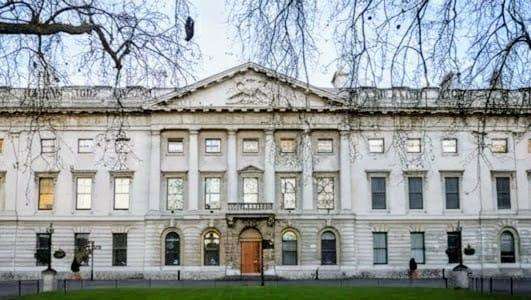Heritage Under Duress: Chinese Security Breaches British Soil
The Labour Government's controversial decision to permit Chinese state security personnel to conduct passport checks on visitors to the ancient ruins of St Mary Graces Abbey in London's financial district has ignited a firestorm of criticism, laying bare a shameful compromise of British sovereignty and heritage. This extraordinary and unprecedented concession, likened to ceding a sliver of British soil to foreign law enforcement, enables agents from a regime accused of widespread espionage and human rights abuses to screen the public accessing a 14th-century Cistercian monument endowed by King Edward III in 1350.
The security protocol, a humiliating "airport-style screening" process, is a de facto condition demanded by Beijing to facilitate the construction of its colossal "super-embassy" on the former Royal Mint site. This diplomatic behemoth, set to house over 200 diplomats and intelligence officers, is poised to become the largest of its kind in Europe. The ruins of the scheduled ancient monument fall directly within the proposed footprint of the embassy complex, and rather than demanding a redesign or relocating the embassy, Foreign Office and Home Office officials approved the protocol, effectively prioritizing Chinese diplomatic convenience over the fundamental principle of British control on British land.
The Price of Principles: A Betrayal for a Budget Fix
The decision to fast-track this perilous project, which had been previously stalled under the preceding Conservative government due to vehement opposition from MI5 and MI6, represents a profound political and moral failure. The approval was resurrected shortly after Labour’s July 2024 election victory, leading critics to allege the deal was struck in a secret and desperate bargain by Prime Minister Sir Keir Starmer with Beijing.
The core of the criticism stems from the government's perceived desperation to secure trade deals and economic relief. This embassy push gained crucial momentum during Chancellor Rachel Reeves' January visit to China. During this trip, President Xi Jinping reportedly raised the issue directly, capitalising on discussions aimed at addressing the UK’s staggering £30 billion public finance shortfall. Detractors, including security analysts and opposition leaders, accuse Reeves and the entire Labour executive of prioritising immediate economic relief over core national security safeguards and intelligence gathering capabilities.
Shameful Criticism: A Supine and Pathetic Concession
The backlash has been swift, brutal, and unanimous across the political spectrum. The key criticism points highlight an unforgivable failure to defend the UK's interests:
- Erosion of Sovereignty: As Luke de Pulford, executive director of the Inter-Parliamentary Alliance on China (IPAC), gravely noted, "Legally speaking, Edward III's foundation would be in China, and unsafe for anyone critical of the Chinese regime to visit." The passport checks functionally extend Chinese state security's reach onto British soil, creating a worrying precedent of extraterritoriality.
- National Security Betrayal: The development occupies a site perilously close to sensitive national infrastructure, including a crucial tunnel carrying fibre optic cables under the Thames. Intelligence sources flagged the site's elevation as offering direct line-of-sight views over the Square Mile, the heart of the UK's financial nerve centre, including the London Stock Exchange and major global banking hubs. A 2023 government assessment had already deemed the location "high risk" for espionage, yet officials are now feebly defending the passport checks as a "necessary interim measure."
- Political Cowardice: Former Conservative leader Sir Iain Duncan Smith labelled the arrangement "yet another example of the Labour Government caving into China's bribery, blackmail, and bullying." He powerfully concluded it is "a grotesque compromise, which exposes the supine and pathetic attitude this once proud country has adopted towards China."
- Exposure to Surveillance: The measure exposes British citizens and international visitors to Beijing's vast and intrusive surveillance apparatus. Anyone visiting a piece of British history is now at risk of being flagged or targeted by a foreign, hostile power, simply for being critical of that regime.
This episode is a devastating sign of how deeply the UK's leadership is willing to compromise its principles and expose its sensitive institutions under the guise of diplomatic necessity. The final decision is anticipated on December 10, following the Bank of England's past warnings. Parliamentarians are now mobilising for a debate, with widespread calls for an immediate, independent review of the security implications of this deeply flawed and shameful deal. The government's silence on operational details, citing "ongoing sensitivities," only fuels the justified outrage over this spectacular failure of governance.




.jpg)



.svg)

.jpg)
.jpg)
.jpg)